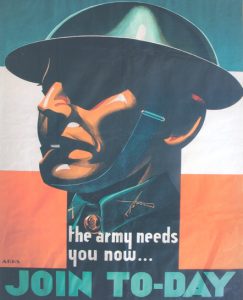Podcast: Irish Army Deserters in the Second World War with Cían Harte

Cathal Brennan and John Dorney interview Cian Harte, author of Heroes Or Traitors? Irish Deserters of WWII about Irish Army deserters in the Second World War. First broadcast on the Irish History Show.
During the Second World War, or The Emergency as it was officially referred to in neutral Ireland, the Irish state contemplated possible invasion by both German and at times by British forces.
Its military was small and poorly armed at the outset of the war and had to be rapidly expanded from about 10,000 to over 40,000 in 1940-41. In addition over 100,000 volunteers were recruited for part-time units such as the Local Defence Force (LDF).
However, as the threat of invasion from either side did not come to pass, the newly enlarged regular army found itself with little to do but mundane tasks such as turf-cutting and tree-felling. Pay and conditions were poor. Under these circumstances, the Irish Army suffered an extra-ordinary rate of desertion.
Were Irish Army deserters traitors to neutral Ireland or idealistic fighters for democracy? Or neither?
By Cían’s estimate, out of some 60,000 men who passed through the Army during the war years, about 7,000 deserted. This amounted to an extraordinary rate of desertion of over 10 per cent, without parallel in other neutral countries.
Of these, about 3-4,000, or nearly half, made their way across the border or the Irish sea and joined the British military, making them about 4-5 per cent of those 70,000 Irish citizens who served in British forces during the Second World War. Roughly 150 Irish Army deserters, according to Cían’s figures, lost their lives serving in British uniform.
Their motives, as we discuss, were various, including boredom, frustration with lack of action, better pay in British forces and, perhaps for some, idealism.
After the war, the Irish government decided not to formally punish the wartime deserters from the Irish Army with a military court martial, but compiled a ‘blacklist’ of 4,800 deserters, who would lose their rights to an army pension and who would not be eligible for public sector work in Ireland for seven years. In addition, as Cían discusses in the interview, some deserters, who had joined the British forces during the war, faced a hostile reaction when they returned to their home communities.
In later years the topic of the treatment of the deserters became a battlefield on which to rehearse debates over the morality of the Irish state’s wartime neutrality. On one side, it was claimed that those who had fought fascism had been unjustly persecuted by a state whose ‘Anglophobia’ had blinded it to the evil represented by Nazi Germany.
On the other, it was argued that, since Ireland had faced a credible threat of invasion from Britain (especially to seize its Atlantic ports) during the war, the deserters’ actions amounted to treason and that far from being unjustly persecuted they were treated exceptionally leniently when they returned home after the war.
In 2012 however, then Minister for Justice, Alan Shatter came down firmly on the former side of the argument, issuing a pardon and amnesty for all of those Defence Forces personnel who had deserted during the War ‘to fight on the Allied side against tyranny’ and apologising for the state’s treatment of them post 1945.
We discuss these perspectives and how the wartime deserters will be seen in the future.